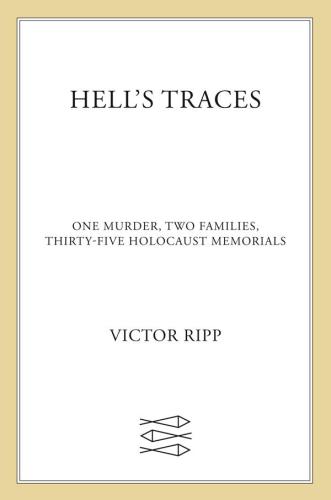
Hell's Traces
One Murder, Two Families, Thirty-Five Holocaust Memorials
- اطلاعات
- نقد و بررسی
- دیدگاه کاربران
نقد و بررسی

December 12, 2016
Ripp (Moscow to Main Street) travels to 35 Holocaust memorials in seven countries in an effort to better understand the short life of his cousin Alexandre, while ruminating on the functions of memorials. Ripp never met his cousin, though the two were close in age; Alexandre was only three years old when he was taken to Auschwitz and killed, along with other 10 family members on the author’s father’s side. The memorials themselves are given more attention than Ripp’s family history. Some of the monuments are well known, such as the main Holocaust Memorial in Berlin; others are considerably off the beaten path, such as the Grodno Ghetto memorial in Belarus and Jochen Gerz’s “disappearing memorial” in Hamburg, which slowly sank underground and is invisible from street level. Ripp is an engaging and empathic writer who has found a unique, moving way to tell his extended family’s story during the Holocaust and to memorably honor his martyred cousin. Agency: Melanie Jackson Agency.

February 1, 2017
A personal attempt to tackle emotionally the Nazi roundup of a 3-year-old relative to the concentration camps.An American Jew whose family escaped the Nazi death machine when another branch of the family did not, Ripp (Pizza in Pushkin Square: What Russians Think About Americans and the American Way of Life, 1990, etc.) resolved to visit European Holocaust memorials in order to garner a visceral sense of what they expressed--and what they were unable to express. The death of his young cousin Alexandre Ripp, in Auschwitz in 1942, followed his "arrest" with his grandmother in Paris in July 1942 ("arrested suggests more force than needed to take a three-year-old into custody"). This served as a poignant reminder that the branch of the family in Berlin with money, the Kahans, was able to emigrate before the Nazis got them, while the working-class Ripps, namely Alexandre's father, Aron, born in Grodno, Poland, and relocated to Paris, were relegated to hiding and eventual execution. The author visited many Holocaust memorials in Europe--35, he claims--many off the beaten path in Poland and Austria, and he is not easily impressed by the good intentions of famous artists. Above all, the author craved a "personal connection" to the memorials, a sense of being moved intimately and outside the institutional setting. "You have to find your proper place in the particular stretch of history that the memorial invokes," writes Ripp. "Tenuously connected or deeply involved, it doesn't matter which, as long as you are honest." His father had come from Grodno, and his memories of the Poles were not generous; the author often scrutinizes and suspects his handlers and translators along the route for being emotionally expedient. Overall, his memoir is prickly and selective, occasionally haphazard, yet he maintains an emotional honestly above all. An idiosyncratic work striving for sense and meaning from a family record of enormous loss and obfuscation.
COPYRIGHT(2017) Kirkus Reviews, ALL RIGHTS RESERVED.

December 1, 2016
His father was a Ripp, while his mother descended from the affluent Kahan family with international connections. Members of the Kahans largely escaped the Holocaust, migrating to the United States, where they continued to prosper. Descendants of the Ripps have a different story altogether. One of the many Ripp victims of the Holocaust was the author's young cousin Alexandre, who disappeared into the maws of Auschwitz in the fall of 1942. Decades later, Victor Ripp (Pizza in Pushkin Square) takes a journey of remembrance as he attempts to make sense of his family's past. He traces Alexandre's path from his arrest in Paris to his death in Auschwitz, visiting numerous Holocaust memorials in countries such as Austria, Switzerland, Poland, and Russia. The author reflects on how people shape history, even monuments, to sugarcoat past transgressions. Even memorials to the Holocaust can be used to play political games. (He exclaims of a monument in Vienna, "How do you spell 'self-serving?' ") VERDICT With a deft touch, Ripp has written one of the more unusual yet effective Holocaust histories. He doesn't preach, just shows.--David Keymer, Modesto, CA
Copyright 2016 Library Journal, LLC Used with permission.




دیدگاه کاربران